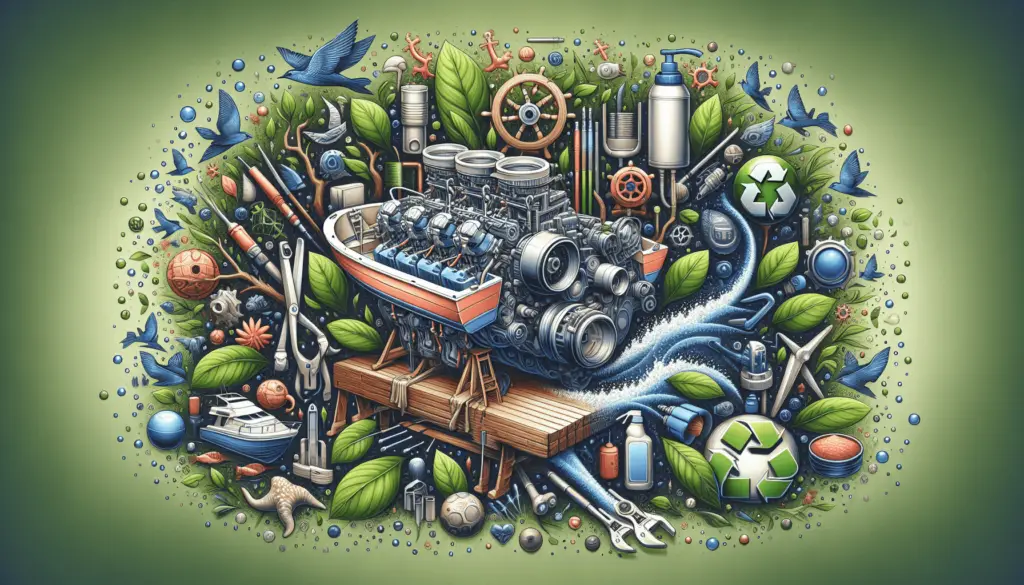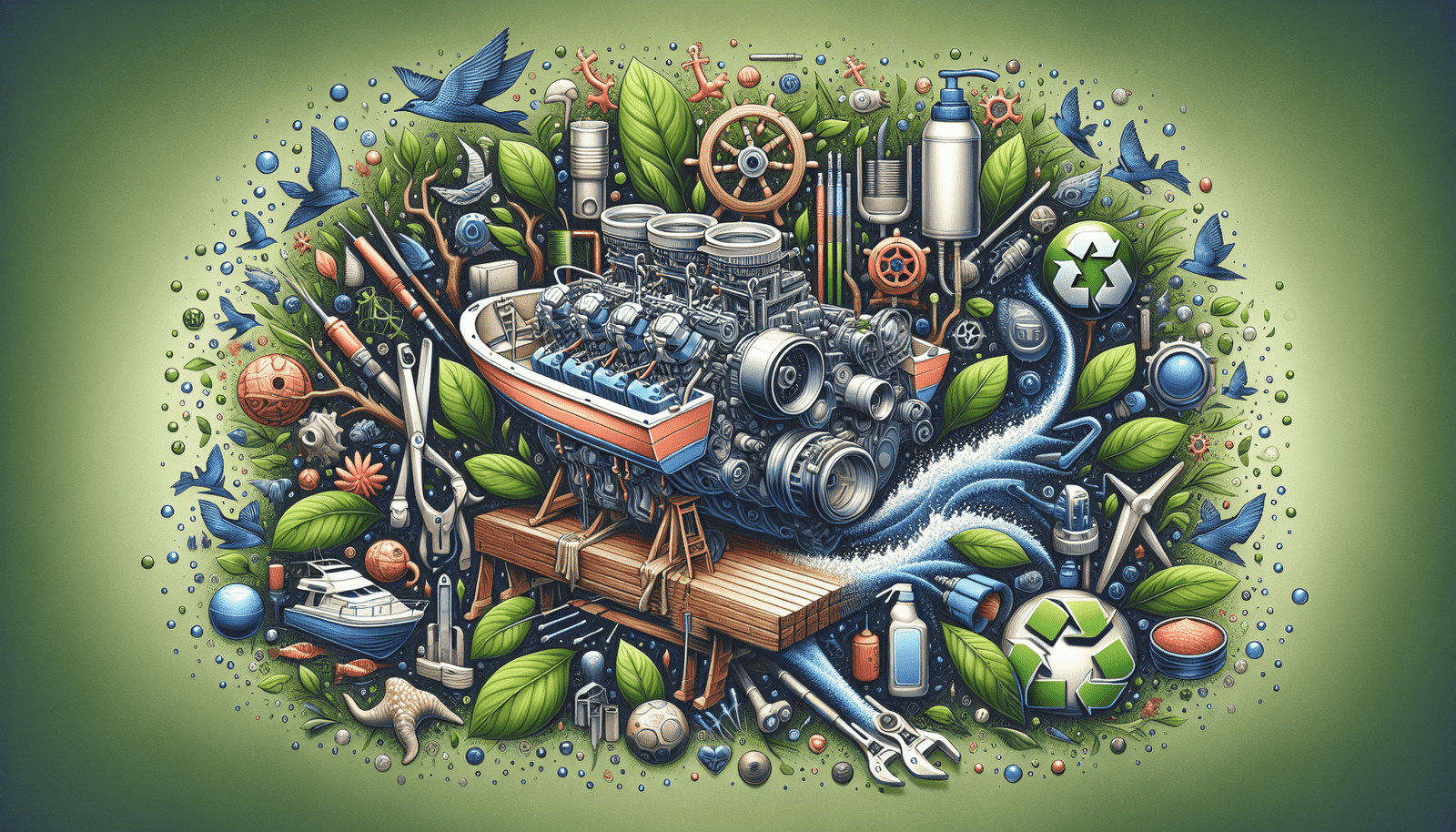Tackling boat engine repairs and maintenance can be quite a task, but have you ever considered doing it the eco-friendly way? The article “Eco-Friendly Approaches To Boat Engine Repairs And Upkeep” is all about maneuvering this navigation. It offers valuable insights and practical tips on how to keep your water vessels running smoothly, all while minimizing environmental impact. Changing your approach to boat engine maintenance can not only improve the lifecycle of your engines but also contribute to healthier water bodies and a safer environment for aquatic life. You wouldn’t want to leave a dirty trail in the water, would you? Let’s lessen the footprint we leave on mother nature together.

Understanding the Impact of Boat Engines on Environment
Boat engines play a pivotal role in the overall health of our ecosystems. When poorly maintained or operated incorrectly they can be significantly harmful to the environment. Understanding this correlation is the first step towards fostering change and implementing eco-friendly practices.
The role of boat engines in water pollution
Boat engines can be a significant source of water pollution, especially if they are not properly maintained. They expel exhaust gases, oil, and fuel residues into the water. Running on outdated or poorly maintained engines increases the chances of potential leaks, which directly contributes to water contamination. All these pollutants can have a detrimental effect on the aquatic life and destabilize the balance of the ecosystem.
Impact of engine emissions on air quality
The emissions from boat engines also have an impact on air quality. Combustion engines emit carbon dioxide (CO2), carbon monoxide (CO2), nitrogen oxides (NOx), and particulate matter, collectively known as greenhouse gases. These emissions contribute to air pollution and are responsible for increasing the earth’s temperature, leading to global warming.
The effect of oil leaks on marine life
Oil leaks from boat engines pose a significant threat to marine life. Oil forms a thick layer on the water surface, which blocks sunlight and reduces the oxygen levels in the water. This condition can lead to a decline in phytoplankton population, disrupting the food chain and endangering the entire marine ecosystem. Moreover, oil it is toxic for many marine species, causing death or altering their reproductive patterns.
Importance of Regular Engine Maintenance
Regular maintenance of your boat engine is not only crucial for the longevity of your engine but also for minimizing its impact on the environment.
Preventing engine problems
By carrying out regular checks and services on your boat engine, you can prevent major problems that could otherwise impair the performance and efficiency of your engine. If any smaller issues are identified and resolved promptly, it reduces the risk of bigger and costlier repairs down the line.
Benefits of regular maintenance for engine lifespan
An adequately maintained engine functions better and lasts longer. Regular maintenance helps in detecting wear and tear and attending to it before it becomes catastrophic. Properly cared-for engines are more fuel-efficient, reliable, safer and uncertain breakdowns resulting in costly repairs can be avoided.
How maintenance reduces negative environmental impact
Maintenance reduces the negative environmental impact by preventing unnecessary emissions and oil leaks. A well-maintained engine is more efficient, reduces emissions, and utilizes fuel more effectively, reducing the amount of pollution produced. Regular checks can also help detect leaks early and prevent them from causing water pollution.
Eco-Friendly Engine Repair Practices
When it comes to repairs, using eco-friendly practices not only helps the environment but can also improve your boat’s overall performance.
Use of environmentally safe products for repair
Swapping conventional products for environmentally safe alternatives is a fundamental step towards achieving eco-friendly repair. There are biodegradable, non-toxic products available, which perform just as well if not better than traditional ones while ensuring minimal impact on the environment.
Proper disposal of old and damaged engine parts
Disposing of old and damaged engine parts in an eco-friendly manner is essential. Recycling is a great option for parts that are made of recyclable materials such as aluminium, steel, and some plastics. Non-recyclable parts should be disposed of at proper waste facilities to prevent them from ending up in landfills.
Reducing pollutant output during repairs
There are several ways to reduce pollutant output during repairs. For instance, use electric or hand-powered tools instead of pneumatic ones, which release harmful pollutants. Additionally, choosing water-based cleaning products over harsh chemical ones can significantly reduce the negative impact on the environment.
Biodegradable Lubricants and Oils
Another factor in becoming more eco-friendly in your boat’s engine maintenance is the use of biodegradable lubricants and oils.
Benefits of biodegradable lubricants over conventional products
Biodegradable lubricants and oils are significantly less harmful to the environment. They break down over time, which greatly reduces their impact on the ecosystem. With comparable performance to conventional oils, biodegradable options cause considerably less pollution and are safer for both the user and the planet.
Availability and cost-effectiveness of biodegradable options
With the growing demand for eco-friendly products, biodegradable lubricants and oils are increasingly available on the market. Although they may be slightly expensive than conventional oils, the long-term environmental benefits they offer make the added cost worthwhile.
Impact of biodegradable oils on engine performance
Despite misconceptions, biodegradable oils do not compromise on engine performance. With improved formulation and technology, these oils provide excellent lubrication, protect the engine from wear and tear and help it run smoothly.
Implementing Alternative Energy Sources
Investing in alternative energy sources for powering boat can significantly reduce environmental impact.
Using solar power for boat engines
Solar power is a clean and renewable energy source. Solar-powered engines generate power from sunlight, massively cutting down on emissions and pollution caused by traditional fuel-powered engines. Though the initial investment might be significant, it pays off in the long run by saving fuel costs.
Understanding wind-powered propulsion
Wind power is another eco-friendly way of powering boats. Sailboats and wind-powered craft have been used for centuries, and they are incredibly energy efficient. Modern technology has significantly improved the functionality and reliability of wind power, making it a viable option for many boaters.
Hybrid engine options for boats
Hybrid engines, using a combination of fuel, solar or wind power, are highly efficient and provide a great compromise between speed, power, and environmental considerations. These engines allow for flexibility depending on the conditions, offering a balance between performance and sustainability.
Fuel Efficiency in Boat Engines
Increasing fuel efficiency in your boat’s engine can help to reduce environmental impact.
How to improve fuel efficiency
Improvements in fuel efficiency can be achieved by regular engine maintenance, using better quality fuels and ensuring proper engine tuning. Also, practising energy-efficient navigation techniques and reducing weight on board can enhance the fuel efficiency.
The correlation between fuel efficiency and lower emissions
Increased fuel efficiency directly results in lower emissions. An engine that uses less fuel emits fewer pollutants, which protects the air and water quality. Therefore, improving the fuel efficiency of a boat is a practical measure to mitigate environmental damage.
Fuel additives that boost efficiency and reduce pollution
Certain fuel additives can enhance fuel efficiency and reduce emissions. These additives work by improving fuel combustion, reducing engine deposit formation and increasing the overall performance of the engine.
Proper Disposal of Waste Fluids and Materials
Correct disposal of waste fluids and materials from boat maintenance is paramount to minimize environmental impact.
Ways to responsibly dispose of waste fluids
Waste fluids such as old oil, fuel, and coolant should be collected and disposed of responsibly. Many waste management facilities and marinas have specific disposal sites for these materials. Never dump these materials into the water or down the drain.
Handling waste engine parts
Similar to waste fluids, old or damaged engine parts should also be disposed of responsibly. Consider recycling the parts where possible or disposing them through a reputable waste management facility.
Environmental impact of improper waste disposal
Improper disposal of waste fluids and materials can lead to significant environmental damage. Fuel, oil, and coolant can contaminate soil, water and harm wildlife. Proper disposal ensures these harmful substances do not end up in our ecosystems and contribute to pollution.
Water-based Engine Cleaning Methods
Water-based cleaning products are an excellent alternative to traditional cleaning methods that often use harsh chemicals.
The impact of conventional cleaning methods on the environment
Conventional cleaning methods often involve chemicals, solvents, and degreasers that are harmful to the environment. These substances can leak into the water, causing pollution and disturbing marine ecology.
Using water-based cleaners for engine maintenance
Water-based cleaners are a safer, eco-friendly alternative for engine cleaning. They are just as effective at cleaning and removing grease but do not have the harmful environmental impacts associated with conventional cleaning products.
Benefits of water-based cleaners
Not only are water-based cleaners better for the environment, but they are also better for your engine. They are non-corrosive, do not leave residue and are safe to use on all engine components. In addition, they are usually less hazardous and safer to handle.
Training and Awareness for Boat Maintenance Staff
Proper training and awareness among boat maintenance staff is crucial for implementing eco-friendly practices.
Importance of eco-friendly training programs
Training programs can equip maintenance staff with the skills and knowledge needed to undertake repairs and maintenance in an environmentally friendly manner. With better understanding, the staff can make informed decisions and contribute to eco-friendly practices.
Increasing awareness of environmental issues among boating community
Increasing awareness among the boating community about the impact of boat maintenance on the environment is also important. This awareness can ensure that individual boat owners, as well as businesses, are committed to green practices and are motivated to seek out eco-friendly options.
Role of maintenance staff in promoting sustainable practices
Trained maintenance staff can play a crucial role in promoting sustainable practices. They can advise boat owners on the best products and techniques to minimize environmental impact. They can also educate them about the importance of eco-friendly behaviors.
Regulations and Standards for Eco-Friendly Boat Maintenance
Regulations and standards are an essential component of achieving eco-friendly boat maintenance.
Current environmental regulations for boat engines
There are several national and international regulations in place to control pollution from boat engines. These include emission standards, rules around the disposal of waste materials, and guidelines on fuel quality. They are designed to reduce the impact of boating activities on the environment.
Role of International Maritime Organization
The International Maritime Organization plays a crucial role in implementing standards for environmentally friendly practices in the maritime industry. They provide regulations and guidance to promote cleaner, safer practices and work with countries worldwide to enforce these.
Policies and incentives for green boating practices
Many governments and organizations are encouraging green boating practices by providing incentives. These could be in the form of grants, tax deductions, or reduced fees for marina services. Taking advantage of these incentives not only helps the environment but can also lower the costs of boat maintenance and operation.

